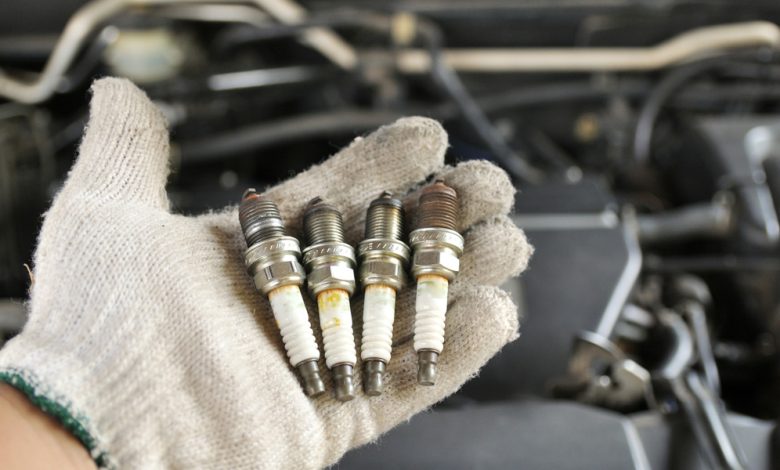How Often Should I Change Spark Plugs?

This is a general answer on how often you should change the spark plugs in your vehicle. That’s because the answers you seek are in your vehicle owner’s manual. In the manual, you will get the replacement interval recommended by your manufacturer. Generally, a vehicle’s spark plugs need replacement after every 30,000 miles.
But, if you don’t replace the plugs on time, you increase the chances of causing engine problems like uneven idling, improper acceleration, and misfiring. Also, if you don’t replace the old spark plugs, it can cause excessive fuel consumption.
What Is a Spark Plug?
A spark plug is an electrical device used in an internal combustion engine to produce a spark which ignites the air-fuel mixture in the combustion chamber. As part of the engine’s ignition system, the spark plug receives high-voltage electricity (generated by an ignition coil in modern engines and transmitted via a spark plug wire) which it uses to generate a spark in the small gap between the positive and negative electrodes. The timing of the spark is a key factor in the engine’s behavior, and the spark plug usually operates shortly before the combustion stroke commences.
When Should a Spark Plug Be Changed?
Like a lot of maintenance practices, better to be safe than sorry. Spark plugs play an integral role in the combustion cycle of the engine, and if that component were to fail, it would lead to an expensive fix.
The first sign that you should pay attention to is your odometer reading. Your service manual will include the interval for a spark plug change. That will depend on what plugs you use. If you hit a certain mileage with your car, then it’ll be time to swap out the old plugs for new ones even if they are in working order. Again, better to be safe than sorry.
Judge how your engine idles. Rough idling when your car is warmed up is a sign that you need to have your plugs replaced. To monitor this, check your car’s tachometer and see if the needle jumps up and down noticeably. Also, if you feel the car’s not running smoothly and there is an excess amount of vibration, that’s another telltale sign.
Loss of power or hesitation while on the accelerator can be attributed to a number of other factors, but a bad spark plug can be part of the problem or the only problem you need to fix. Again, this is another sign that you need new plugs.
Poor fuel economy might not be noticed right away, but if you notice that your fuel economy is way below what it should be, then it may be time to check your plugs. Loss of power and fuel economy go hand in hand, and you may not notice your foot pressing deeper and deeper into the accelerator thus consuming more fuel than needed.
If you can’t get your car to start, it is likely that there’s more than one problem plaguing it, or that a spark plug is a culprit if the engine is not turning over.
What Happens If the Spark Plug Is Changed Too Late?
There are a couple of bad things that can take place if you don’t change your spark plugs on time, aka the manufacturer’s recommended intervals!
First and foremost, your car’s engine will have to work harder. This is because the spark plugs will slowly become encrusted with deposits from the combustion process. As they become caked with this stuff, it becomes more difficult for them to create a spark. When this happens, your engine has to use more fuel to compensate for the loss of efficiency.
Not only will your motor have to work harder, but it will also be less effective at doing its job. This loss in performance will eventually lead to a decrease in fuel economy. So not only will you have to spend more money on gas, but you’ll also be visiting the pump more often than you’d like.
If you let your spark plugs go for too long, you could do some severe damage to your engine. The deposits that build upon the plugs can eventually cause them to misfire. When this happens, the unburned fuel in the cylinders can start to eat away at the cylinder walls. This can cause dangerous pressure levels to build up, and it can even lead to engine failure.
What Are the Factors That Shorten the Life of Spark Plugs?
Heavy oil and fuel deposits can foul the spark plugs, preventing the spark from firing off properly.
Spark plugs that aren’t gapped properly can reduce engine performance and even cause knocking and pinging.
A completely dead spark plug can cause the engine to misfire, which reduces performance while causing potential damage elsewhere.
Actual physical contact between the cylinder and spark plug can cause the spark plug to break off, potentially causing catastrophic damage to the cylinder, cylinder walls and valves.
FAQ
How Much Does It Cost To Change Spark Plugs?
Mechanics and auto shops will typically charge anywhere from $115 to $200 for a professional spark plug replacement. The average spark plug replacement entails about four to eight total plugs –thus, the higher replacement cost.
Should You Replace All Spark Plugs At Once?
Generally speaking, it is wise to change all of your spark plugs at once. Unless one of your spark plugs has become badly damaged or broken, replacement of all plugs at once will help to ensure consistent levels of performance in your engine.
What Happens If You Don’t Gap Your Spark Plugs?
If the spark plug gap is incorrectly set, it can lead to engine issues. The customer may experience loss of power, misfires, spark plug fouling, increased plug wear, or poor gas mileage.
